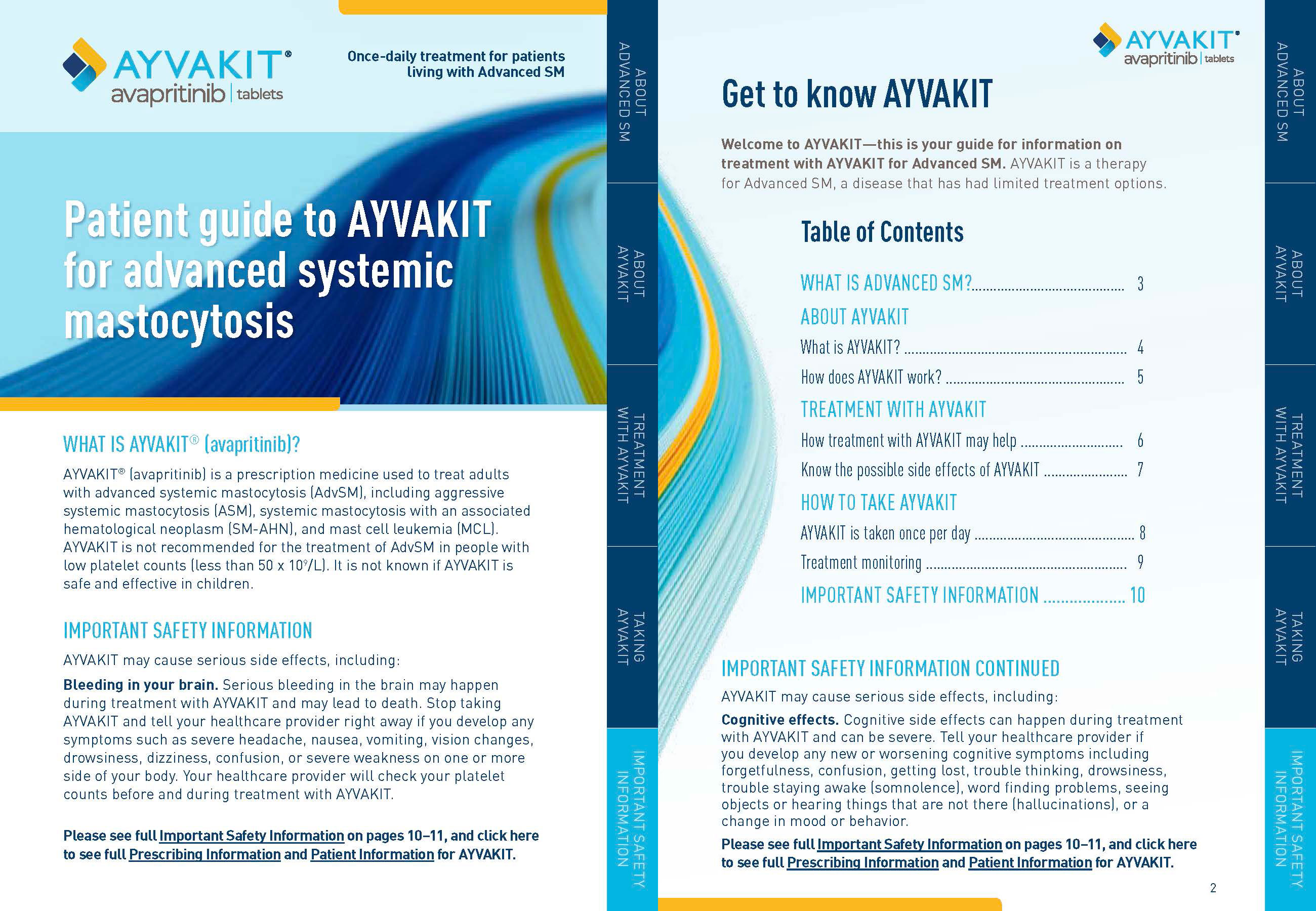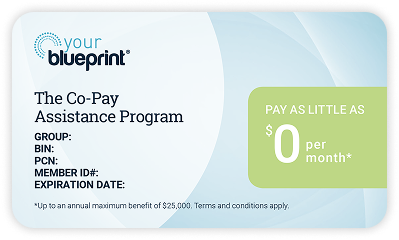Advanced Systemic Mastocytosis (AdvSM)
Discover a Targeted Treatment for Adults with AdvSM
Patient Portrayal
AYVAKIT® (avapritinib) is a prescription medicine that targets an underlying mutation
found in ~95% of people with systemic mastocytosis1-3
AYVAKIT may be right for you
Learn how AYVAKIT works, who it's for, and how it performed in clinical trials.
Emails and resources to
stay connected with the latest information

Get to know AYVAKIT for AdvSM
Explore the patient brochure for more information on AdvSM and treatment with AYVAKIT.
This brochure is intended for digital use only. If you decide to print it, please be sure to print a copy of the full Prescribing Information as well.
Get resources to help on your treatment journey

YourBlueprint® is a patient support program designed to assist you with personalized support right from the start of your treatment with AYVAKIT by providing:
-
One-on-one
support -
Financial assistance
options -
Helpful
resources
or call us at 1-888-258-7768
Monday–Friday, 8 AM–8 PM
Eastern Time (ET)
Co-Pay Assistance Program
You may be eligible
to pay as little as $0
for your
prescription.†
†Up to an annual maximum benefit of $25,000. Terms and conditions apply.
For those who qualify, this program covers:
- Co-pay
- Co-insurance
- Deductible expenses

Read the terms and conditions,
or call us at 1-888-BLUPRNT
(1-888-258-7768) to learn more.
References: 1. Garcia-Montero AC, et al. Blood. 2006;108(7):2366-2372. 2. Kristensen T, et al. Am J Hematol. 2014;89(5):493-498. 3. Ungerstedt J, et al. Cancers. 2022;14(16):3942.
INDICATION
WHAT IS AYVAKIT® (avapritinib)?
AYVAKIT® (avapritinib) is a prescription medicine used to treat adults with advanced systemic mastocytosis (AdvSM), including aggressive systemic mastocytosis (ASM), systemic mastocytosis with an associated hematological neoplasm (SM-AHN), and mast cell leukemia (MCL). AYVAKIT is not recommended for the treatment of AdvSM in people with low platelet counts (less than 50 x 109/L). It is not known if AYVAKIT is safe and effective in children.
IMPORTANT SAFETY INFORMATION
AYVAKIT® (avapritinib) may cause serious side effects, including:
Bleeding in your brain. Serious bleeding in the brain may happen during treatment with AYVAKIT and may lead to death. Stop taking AYVAKIT and tell your healthcare provider right away if you develop any symptoms such as severe headache, nausea, vomiting, vision changes, drowsiness, dizziness, confusion, or severe weakness on one or more side of your body. Your healthcare provider will check your platelet counts before and during treatment with AYVAKIT.
Cognitive effects. Cognitive side effects can happen during treatment with AYVAKIT and can be severe. Tell your healthcare provider if you develop any new or worsening cognitive symptoms including forgetfulness, confusion, getting lost, trouble thinking, drowsiness, trouble staying awake (somnolence), word finding problems, seeing objects or hearing things that are not there (hallucinations), or a change in mood or behavior.
Skin sensitivity to sunlight (photosensitivity). Your skin may be sensitive to the sun or other forms of light (photosensitivity) during treatment with AYVAKIT. Avoid or limit exposure to direct sunlight, sunlamps, and other sources of ultraviolet radiation during treatment and for 1 week after stopping treatment with AYVAKIT. Use sunscreen or wear clothes that cover your skin if you need to be out in the sun.
Before taking AYVAKIT, tell your healthcare provider about all of your medical conditions, including if you:
- history of bulging or weakening of a blood vessel wall (aneurysm) or bleeding in your brain
- have a history of stroke within the last year
- have low platelet counts
- have or have had liver problems
- are pregnant or plan to become pregnant. AYVAKIT can cause harm to your unborn baby
- Females who are able to become pregnant: Your healthcare provider should do a pregnancy test before you start AYVAKIT. You should use effective birth control (contraception) during treatment with AYVAKIT and for 6 weeks after the final dose of AYVAKIT. Talk to your healthcare provider about birth control methods that may be right for you. Tell your healthcare provider right away if you become pregnant or think you may be pregnant during treatment with AYVAKIT.
- Males with female partners who are able to become pregnant should use effective birth control (contraception) during treatment and for 6 weeks after the final dose of AYVAKIT.
- are breastfeeding or plan to breastfeed. It is not known if AYVAKIT passes into your breast milk. Do not breastfeed during treatment with AYVAKIT and for at least 2 weeks after the final dose of AYVAKIT. Talk to your healthcare provider about the best way to feed your baby during this time
Tell your healthcare provider about all the medicines you take, including prescription and over-the-counter medicines, vitamins, and herbal supplements. AYVAKIT may affect the way other medicines work, and certain other medicines may affect how AYVAKIT works. Especially tell your healthcare provider if you take estrogen-containing hormonal birth control or medicines that prevent blood clots.
Do not drive or operate hazardous machinery if you have confusion or trouble thinking during treatment with AYVAKIT.
The most common side effects of AYVAKIT in people with AdvSM include: fluid retention or swelling, diarrhea, nausea, tiredness or weakness, and changes in certain blood tests.
Your healthcare provider may change your dose, temporarily stop, or permanently stop treatment with AYVAKIT if you develop certain side effects. AYVAKIT may cause fertility problems in females and males. Talk to your healthcare provider if this is a concern for you.
These are not all of the possible side effects of AYVAKIT. Call your doctor for medical advice about side effects. You are encouraged to report side effects of prescription drugs to the FDA. Visit www.fda.gov/medwatch or call 1-800-FDA-1088.
AYVAKIT is available in 25-mg, 50-mg, 100-mg and 200-mg tablets.
Please click here to see the full Prescribing Information and Patient Information for AYVAKIT.
INDICATION & IMPORTANT SAFETY INFORMATION
AYVAKIT® (avapritinib) may cause serious side effects, including:
Bleeding in your brain. Serious bleeding in the brain may happen during treatment with AYVAKIT and may lead to death. Stop taking AYVAKIT and tell your healthcare provider right away if you develop any symptoms such as severe headache, nausea, vomiting, vision changes, drowsiness, dizziness,
INDICATION & IMPORTANT SAFETY INFORMATION
Warning: AYVAKIT® (avapritinib) may cause serious side effects, including bleeding in your brain, cognitive effects, skin sensitivity to sunlight (photosensitivity), harm to your unborn baby.
INDICATION & IMPORTANT SAFETY INFORMATION
Warning: AYVAKIT® (avapritinib) may cause serious side effects, including bleeding in your brain, cognitive effects, skin sensitivity to sunlight (photosensitivity), harm to your unborn baby.
INDICATION
WHAT IS AYVAKIT® (avapritinib)?
AYVAKIT® (avapritinib) is a prescription medicine used to treat adults with advanced systemic mastocytosis (AdvSM), including aggressive systemic mastocytosis (ASM), systemic mastocytosis with an associated hematological neoplasm (SM-AHN), and mast cell leukemia (MCL). AYVAKIT is not recommended for the treatment of AdvSM in people with low platelet counts (less than 50 x 109/L). It is not known if AYVAKIT is safe and effective in children.
IMPORTANT SAFETY INFORMATION
AYVAKIT® (avapritinib) may cause serious side effects, including:
Bleeding in your brain. Serious bleeding in the brain may happen during treatment with AYVAKIT and may lead to death. Stop taking AYVAKIT and tell your healthcare provider right away if you develop any symptoms such as severe headache, nausea, vomiting, vision changes, drowsiness, dizziness, confusion, or severe weakness on one or more side of your body. Your healthcare provider will check your platelet counts before and during treatment with AYVAKIT.
Cognitive effects. Cognitive side effects can happen during treatment with AYVAKIT and can be severe. Tell your healthcare provider if you develop any new or worsening cognitive symptoms including forgetfulness, confusion, getting lost, trouble thinking, drowsiness, trouble staying awake (somnolence), word finding problems, seeing objects or hearing things that are not there (hallucinations), or a change in mood or behavior.
Skin sensitivity to sunlight (photosensitivity). Your skin may be sensitive to the sun or other forms of light (photosensitivity) during treatment with AYVAKIT. Avoid or limit exposure to direct sunlight, sunlamps, and other sources of ultraviolet radiation during treatment and for 1 week after stopping treatment with AYVAKIT. Use sunscreen or wear clothes that cover your skin if you need to be out in the sun.
Before taking AYVAKIT, tell your healthcare provider about all of your medical conditions, including if you:
- history of bulging or weakening of a blood vessel wall (aneurysm) or bleeding in your brain
- have a history of stroke within the last year
- have low platelet counts
- have or have had liver problems
- are pregnant or plan to become pregnant. AYVAKIT can cause harm to your unborn baby
- Females who are able to become pregnant: Your healthcare provider should do a pregnancy test before you start AYVAKIT. You should use effective birth control (contraception) during treatment with AYVAKIT and for 6 weeks after the final dose of AYVAKIT. Talk to your healthcare provider about birth control methods that may be right for you. Tell your healthcare provider right away if you become pregnant or think you may be pregnant during treatment with AYVAKIT.
- Males with female partners who are able to become pregnant should use effective birth control (contraception) during treatment and for 6 weeks after the final dose of AYVAKIT.
- are breastfeeding or plan to breastfeed. It is not known if AYVAKIT passes into your breast milk. Do not breastfeed during treatment with AYVAKIT and for at least 2 weeks after the final dose of AYVAKIT. Talk to your healthcare provider about the best way to feed your baby during this time
Tell your healthcare provider about all the medicines you take, including prescription and over-the-counter medicines, vitamins, and herbal supplements. AYVAKIT may affect the way other medicines work, and certain other medicines may affect how AYVAKIT works. Especially tell your healthcare provider if you take estrogen-containing hormonal birth control or medicines that prevent blood clots.
Do not drive or operate hazardous machinery if you have confusion or trouble thinking during treatment with AYVAKIT.
The most common side effects of AYVAKIT in people with AdvSM include: fluid retention or swelling, diarrhea, nausea, tiredness or weakness, and changes in certain blood tests.
Your healthcare provider may change your dose, temporarily stop, or permanently stop treatment with AYVAKIT if you develop certain side effects. AYVAKIT may cause fertility problems in females and males. Talk to your healthcare provider if this is a concern for you.
These are not all of the possible side effects of AYVAKIT. Call your doctor for medical advice about side effects. You are encouraged to report side effects of prescription drugs to the FDA. Visit www.fda.gov/medwatch or call 1-800-FDA-1088.
AYVAKIT is available in 25-mg, 50-mg, 100-mg and 200-mg tablets.
Please click here to see the full Prescribing Information and Patient Information for AYVAKIT.
